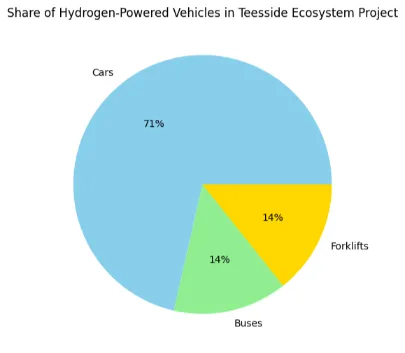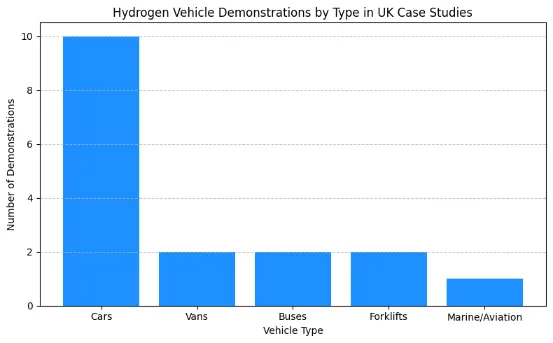
Hydrogen Vehicles UK: Real-World Case Studies of Hydrogen-Powered Transport
Hydrogen fuels in the UK are increasingly important in the transition to clean transport. Across various sectors, including passenger cars, commercial vans, buses, and freight, real-world projects are demonstrating hydrogen’s ability as a zero-emission fuel. These case studies show how hydrogen vehicles are being integrated into the UK transport system, supporting decarbonisation goals and promoting wider adoption.
Teesside Hydrogen Vehicle Ecosystem: Multi-Modal Trials
A key project showcasing hydrogen’s potential in the UK is the Teesside Hydrogen Vehicle Ecosystem, funded by the Department for Transport and Innovate UK. This initiative involves a team that includes Element Energy, Toyota, Caetano, Wrightbus, and TRL, focusing on real-world trials of hydrogen vehicles across various transport modes.
Passenger Cars
Ten Toyota Mirai hydrogen fuel cell electric cars were deployed with operators like Cleveland Police, NHS patient transport, and Stagecoach. These vehicles ran on specific routes, gathering data on fuel consumption, energy production, and regenerative braking.
Buses
Caetano supplied a single-decker hydrogen bus for Stagecoach, and Wrightbus provided a hydrogen double-decker bus for Arriva. Both buses operated on existing routes to show their reliability and emissions benefits.
Commercial Vehicles
Two Toyota hydrogen fuel cell forklifts are in use at Teesside International Airport’s logistics warehouse, highlighting hydrogen’s usefulness in off-road and industrial applications.
Refuelling Infrastructure
All vehicles relied on the Element 2 hydrogen refuelling station at the airport, emphasizing the importance of integrated hydrogen supply chains.
TRL led the trial design and data analysis, using automated telematics to provide independent evidence of hydrogen vehicles’ benefits compared to diesel alternatives.
Hydrogen Fuel Cell Vans for Commercial Use
Sustainable vehicle manufacturer Innervated Vehicle Engineering (IVe) is creating hydrogen fuel cell-powered vans as part of the Teesside Hydrogen Refuelling Hub consortium. These vans are retrofitted with hydrogen fuel cell powertrains to replace diesel engines. They target retail delivery routes with payload capacities of 1,500 kg and ranges up to 600 km.
The project tests real-world performance, including power efficiency, emissions, and operational impacts under varying weather and driving conditions. This initiative addresses the emissions challenge from growing delivery fleets and offers a zero-emission option with quick refuelling and a long range compared to battery electric vans.
Hydrogen Refuelling Trucks and Mobile Solutions
Fuel Cell Systems Ltd (FCSL) has created multiple generations of hydrogen refuelling trucks since 2016, overcoming infrastructure gaps with mobile hydrogen delivery. Their latest third-generation HyTruck, launched in 2024, combines hydrogen refuelling with battery-electric vehicle technology, achieving zero-emission operations and supporting initiatives like:
- The UK’s first hydrogen train refuelling.
- Metropolitan Police hydrogen scooter trials.
- The HyFlyer zero-emission aviation project.
This mobile refuelling ability is crucial for early hydrogen vehicle adoption, especially in areas without permanent infrastructure.
Hydrogen-Powered Public Transport in South Wales
An innovative project in South Wales shows how locally-produced electrolytic green hydrogen can power public transport. Supported by key partners, this initiative highlights green hydrogen’s role in reducing urban emissions and encouraging sustainable transport options, reinforcing the UK’s commitment to clean mobility.
Hydrogen Fuel Cell Vehicles in Automotive Manufacturing
Toyota’s Burnaston manufacturing plant worked with Fuel Cell Systems to set up a complete hydrogen storage, production, and refuelling station. This facility supports the production and testing of hydrogen fuel cell vehicles, including the Toyota Mirai, emphasizing the integration of hydrogen technology in automotive manufacturing and supply chains.
Summary of Benefits from UK Case Studies
Zero Tailpipe Emissions
All hydrogen vehicles emit only water vapor, greatly reducing urban air pollution and greenhouse gases.
Operational Viability
Real-world trials show comparable range and refuelling times to diesel vehicles, with dependable performance across various applications.
Infrastructure Integration
Projects highlight the need for coordinated hydrogen production, storage, and refuelling infrastructure to support fleet operations.
Economic and Environmental Impact
Hydrogen vehicles promote regional economic growth, job creation, and help the UK meet its net-zero transport goals.
Learn more about hydrogen transport innovations like the HydroFLEX train project and the future of hydrogen trains in the UK.
Conclusion
Hydrogen fuels in the UK are no longer just theoretical. Real-world case studies across the nation show their practical application and benefits in transport. From multi-modal trials in Teesside to innovative mobile refuelling and public transport projects, hydrogen vehicles are proving to be a clean, efficient, and scalable alternative to fossil fuels. These groundbreaking efforts set the stage for broader hydrogen adoption, assisting the UK in achieving a sustainable, net-zero transport future.

- Processes | MDPI: Article 11(9):2730 – Peer-reviewed research article from MDPI’s Processes journal.
- Hydrogen vehicles and mobility | Allianz UK – Insightful overview of hydrogen as an energy carrier and its role in mobility and transport sectors.